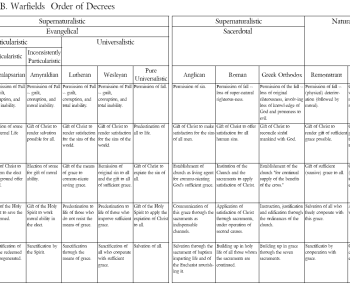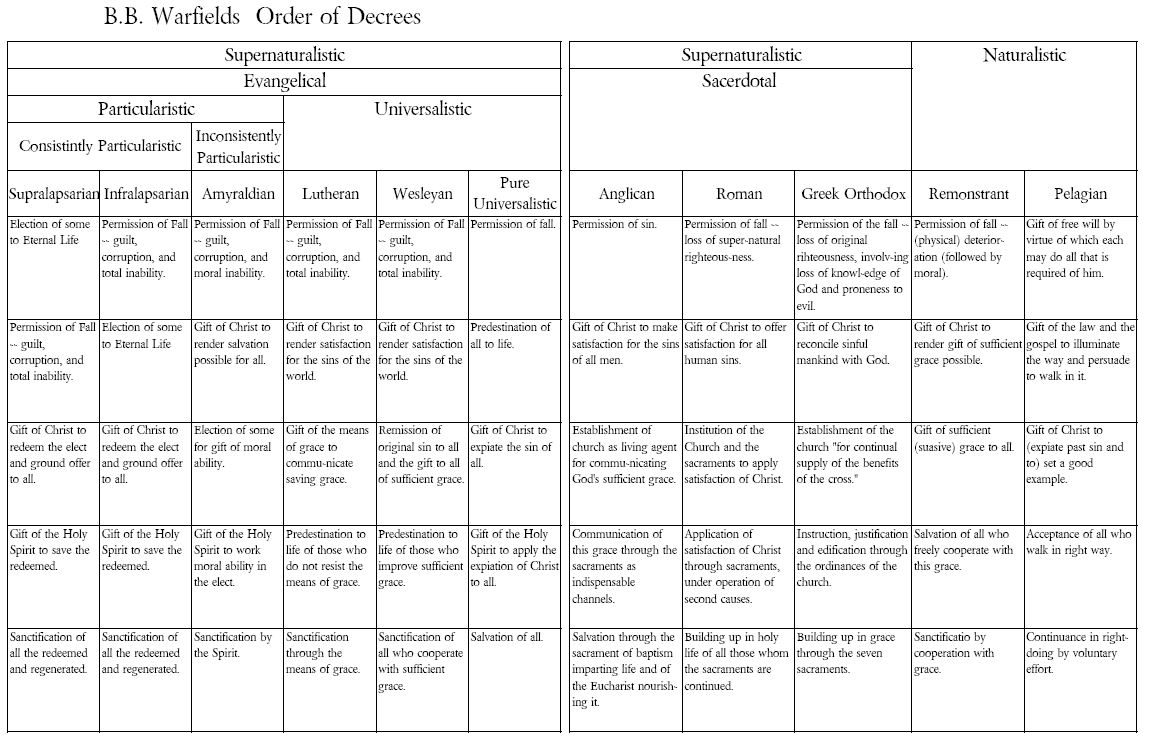
Christianity is very diverse in it’s theology. While Christianity has no easy categorization of beliefs, Christians will generally fall into one of two types: the Naturalist or the Supernaturalist. Most Christians are a mixture of Supernaturalist and Naturalist; however, most Christians lean towards naturalism. This has to do with the understanding of the “Order of Decrees.” Benjamin Breckenridge Warfield drafted a very clear chart that shows where Christians lie in the spectrum in the “Order of Decrees.”
The Naturalist or Naturalism
The Naturalist Christian denys that God rules everything and governs creation through providence. They basically believe that God created everything and then let everything run by natural laws. This is the major point of Deism and hardcore free will proponents.
Naturalism: a theory denying that an event or object has a supernatural significance; specifically : the doctrine that scientific laws are adequate to account for all phenomena
Merriam-Websters Dictionary
The Supernaturalist or Supernaturalism
The Supernaturalist believes God controls creation and that nothing is arbitrary or by chance.
Supernaturalism: belief in a supernatural power and order of existence
Merriam-Websters Dictionary
The core issue between the Supernaturalist and Naturalist Christian is how each views the “Order of Decrees” according to Gods creation and providence.
What are “The Order of Decrees”
The order of decrees are a Christian teaching of how God created and governs all His creation. How the particular Christian views this will influence whether their theology is “Supernatualist” or “Naturalist.” The Reformed view is put clearly in the Westminster Shorter Catechism.
Q. 7. What are the decrees of God?
A. The decrees of God are, his eternal purpose, according to the counsel of his will, whereby, for his own glory, he hath foreordained whatsoever comes to pass.
The Westminster Shorter Catechism Question 7
According to the Reformed Faith, God foreordained everything by creating it and governing it according to His “Providence.”
Q. 8. How doth God execute his decrees?
A. God executeth his decrees in the works of creation and providence.
The Westminster Shorter Catechism Question 7
While it is true that Christians believe God created everything and maintains His creation, there are many differing viewpoints on how God did/does this.
What is the difference between the teachings of creation and Providence in Christianity?
The Supernaturalist and the Naturalist teaching on creation and providence are opposites. The Supernaturalist teaches that God created everything and makes all things happen according to His will. The Supernaturalist believes God does nothing based off of what He “see’s in the future” nor is anything a random event; but, everything is according to God’s plan.
The Naturalist believes God created everything and set it in motion to sustain itself. Everything works according to random events that God does not control. The spectrum of differing beliefs varies from the “Particular Supernaturalist” all the way to the “Pelagian Naturalist.”
B.B. Warfields Chart for “the Order of Decrees” in Christiandom
B.B. Warfield graphically represented the entire Christian spectrum of beliefs in his book “The Plan of Salvation.” The graph is a general representation of the church as a whole and of coarse cannot possibly exhaustively represent the beliefs of all denominations that exist. The far left is the “Calvanistic” view of Salvation. As you move to the right the theological point of view becomes more naturalistic. The most “naturalistic” theology in Christianity is the “Pelagian” view.
The rows in the Chart below describe each theological viewpoint following the Reformed “T.U.L.I.P.” format. This is only to form a base for categorizing each theological point of view as “Naturalistic” or “Supernaturalistic.”
Particular Supernaturalist Christianity
For example, on the left side, the “Infralapsarian” position is the “Particular Supernaturalist” view called T.U.L.I.P.:
- T for Total inability of free will
- U for Unconditional Election of some for salvation
- L for Limited Atonement where Christs death redeems the elect of all sin past, present, and future
- I for Irresistible Grace where the Gift of the Holy Spirit ultimately converts and saves the redeemed
- P for Perseverance of the Saints where the redeemed are sanctification unto salvation
Pelagian Naturalist Christianity
The opposite far right view, the “Pelagian” position, is the “Naturalist” view that denies all points in T.U.L.I.P.:
- Free will by virtue which all man can keep all of God’s commandments
- Gods Law to persuade people to walk in it and nobody is elect
- Christs death makes possible salvation; but does not actually forgive sins without free will acceptance
- Acceptance of all who walk in the right way by their free will
- Salvation of those who voluntarily follow and keep God’s commandments on their own free will
With the “Particular Supernaturalist” view, God orchestrates all necessary events for a persons salvation outside of their individual will. With the “Pelagian Naturalist” view, God does not interfere with any of the events necessary for a persons salvation; but, salvation is solely based on the will of the individual.
Brief Explanation of the chart
Christianity has a wide spectrum between Supernaturalism and Naturalism. Below is a brief explanation of each general group within the spectrum.
| B.B. Warfields Order of Decrees |
|---|
| Supernatural – Particularistic |
| Supralapsarian: All things, including the fall of man, were predestined. Mankind became totally depraved. Christs atonement is for the elect only. The Holy Spirit causes the salvation of God’s elect outside of the persons will. All of God’s elect are eternally secure. 5 point |
| Infralapsarian: Mankind became totally depraved. All things, except the fall of man, were predestined. Christs atonement for the elect. The Holy Spirit causes the salvation of God’s elect outside of the persons will. All of God’s elect are eternally secure. 5 point |
| Amyraldian: All men became depraved. Christs atonement was for all people. Then God predestined everything. The Holy Spirit causes the salvation of God’s elect outside of the persons will. All of God’s elect are eternally secure. 4 point |
| Supernatural – Universalistic |
| Lutheran: People are totally corrupt. Christ died for everybody without exception. The Holy Spirit causes the salvation of God’s elect outside of the persons will. God predestined people according to God’s choice. People can lose their salvation and have eternal security. 3.5 points |
| Weslyan: People are totally corrupt. Christ died for everybody without exception. God predestined people according to their choice. People co-operate with the Holy Spirit in salvation and keep themselves in Gods favor through their choice. People are eternally secure. 2 point |
| Pure Universalistic: God predestined all, Christ died for all, the Holy Spirit calls all even after death, and saves all people universally. 2 point ? |
| Supernatural – Sacerdotal |
| Anglican: People are saved through baptism, the Eucharist, and church participation. 1 point |
| Roman: People are saved by going to church and performing the sacraments. Outside of church they are lost. 1 point |
| Greek Orthodox: People are saved by cooperating with God through the sacraments administered by the church. They believe in human depravity in regards to “Original Sin” and the regeneration by the Holy Spirit; but deny God predestines anything and that people can have “Eternal Security.” They believe Christs death applies to all but man must accept it for the atonement to be effective. 1 point |
| Naturalistic |
| Remonstrant: God predestines everything based off of what people do. All people are solely responsible for following God on their own power by cooperating with God. They believe in partial depravity in regards to “Original Sin” but deny almost all of Supernaturalist theology. 0 point |
| Pelagian: People are solely responsible for following God on their own power with no interference from God. People were not depraved by sin and have capability do do good. They deny all Supernaturalist theology. 0 point |
